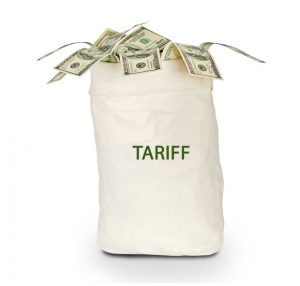Trump Administration Hits $200 Billion in Chinese Imports with 10% Tariff
The Trump administration announced after markets closed Monday that it would go through with the imposition of a 10% tariff on $200 billion worth of Chinese goods.
Need buying strategies for steel? Request your two-month free trial of MetalMiner’s Outlook
The tariffs — stemming from the United States Trade Representative’s (USTR) Section 301 investigation of Chinese trade practices — will go into effect Monday, Sept. 24, and will escalate to 25% as of Jan. 1, 2019.
Taking into account the $50 billion in tariffs that have already gone into effect, the additional $200 billion means about half of the value of Chinese exports to the U.S. is now subject to tariffs (in 2017, the value of U.S. imports of Chinese goods hit just over $505 billion).
However, the tariffs don’t stop there — the U.S. will add $267 billion in tariffs if China responds with retaliatory tariffs, according to a statement from the White House.
“For months, we have urged China to change these unfair practices, and give fair and reciprocal treatment to American companies,” the White House statement read. “We have been very clear about the type of changes that need to be made, and we have given China every opportunity to treat us more fairly. But, so far, China has been unwilling to change its practices.
“To counter China’s unfair practices, on June 15, I announced that the United States would impose tariffs of 25 percent on $50 billion worth of Chinese imports. China, however, still refuses to change its practices – and indeed recently imposed new tariffs in an effort to hurt the United States economy.”
According to a USTR release, the finalized list of products in this $200 billion tranche of tariffs includes 5,745 full or partial lines out of the originally proposed 6,031 tariff lines.
“Included among the products removed from the proposed list are certain consumer electronics products such as smart watches and Bluetooth devices; certain chemical inputs for manufactured goods, textiles and agriculture; certain health and safety products such as bicycle helmets, and child safety furniture such as car seats and playpens,” the USTR release states.
U.S. Rep. Kevin Brady (R-TX), chairman of the House Ways and Means Committee, in a statement expressed support for measures aimed at addressing alleged unfair trade practices by China, but offered a cautionary note vis-a-vis the impact of tariffs.
“Any time tariffs are imposed I worry that Americans will be forced to pay extra costs – in this case on nearly half of U.S. imports from China,” Brady said. “I continue to emphasize that the ultimate means to create an effective outcome is for President Trump and President Xi to engage constructively to develop a long-term and profound solution that levels the playing field for American manufacturers, farmers, and workers.
“Until China comes to the table, one way to relieve pressure on Americans is establish an effective and timely process to allow products to be excluded from these additional tariffs if tariffs would make it harder for us to sell more ‘Made in America’ products globally.”
Thomas J. Donohue, president and CEO of the U.S. Chamber of Commerce, disapproved of the decision.
“The U.S. economy runs on pro-growth policies, but that’s not what tariffs on $200 billion worth of Chinese goods deliver,” he said in a statement. “The administration has serious issues to resolve with China on market access, unfair subsidies, technology theft, and cybersecurity. But there are less harmful ways to truly achieve free and fair trade with China.
“Today’s decision makes clear that the administration did not heed the numerous warnings from American consumers and businesses about rising costs and lost jobs on Main Street, in factories, and on farms and ranches across the country. Both countries should stay at the negotiating table, and the U.S. should continue working with its allies to seek alternative solutions.”
On the other hand, Alliance for American Manufacturing President Scott Paul supported the move to put additional pressure on China.
For more efficient carbon steel buying strategies, take a free trial of MetalMiner’s Monthly Outlook!
“Strong trade enforcement against China’s persistent violations of trade laws, including the theft of American trade secrets, is long overdue,” Paul said. “These tariffs should compel China to finally address unfair trade practices. America has the leverage in this economic relationship, and it’s about time we use it to defend our workers and businesses who can compete with anyone on a truly level playing field.”
The full list of Chinese products included within the latest round of tariffs can be found here.



Leave a Reply